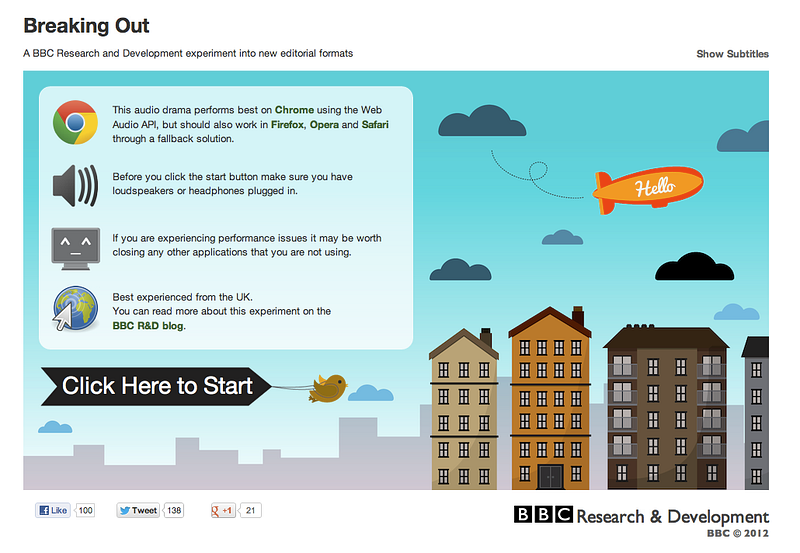Earlier in July at SMC_MCR, a monthly digital and social technology meet up in Manchester UK, BBC R&D demonstrated a new approach to personalised entertainment called Perceptive Media. It is something that BBC producer Ian Forrester had been talking about for some time, being revealed at SMC_MCR in February. At that point it was hard to understand what the concept entailed. It was explained as a way of delivering media that was tailored to individual preference and environment but little else.

On their return in July the team showcased a short radio play demonstrating some of the concepts of Perceptive Media. The play can be found here http://futurebroadcasts.com/ At first listening the play seems to follow the traditional radio play form, but within the play there are certain personalisations that are based upon the location of the listener. After a couple of listenings it is quite obvious where the personalisations exist. As Ian Forrester stated in the Q&A, it was a fairly basic demonstration of the technology pointing to the challenges of narrative personalisation and the ability to create these personalisations ‘on the fly’, in the browser. Even with such a short and somewhat basic demonstration of Perceptive Media it is easy to see how it could develop into a more complex form cutting across platforms.
The personalisation aspect of Perceptive Media comes from the creation of a narrative framework that allows certain variables to be inserted, with these variables influenced from the data that the Perceptive Media storyteller has access to. In the case of ‘Breaking Out’ — the play in the demonstration — the data accessed was local weather, listings and local news. As more data is made available it is easy to see how it could be integrated into a Perceptive Media framework. The demonstration offers a glimpse into a new form of story telling based on an individuals location and environment and if coupled with personal data — preference and situation.
In 2009 at FutureEverything there was a presentation by Philip Trippenbach, then at the BBC, about the construction of narrative in games especially first person games. He highlighted a game called ‘Six days in Fallujah’ which he writes about here http://trippenbach.com/2009/06/09/six-days-in-fallujah-and-the-dirty-g-word/ What I find of interest is the possible use of the form to be educational, to disseminate news and information in a way that many would be uncomfortable with. What Trippenbach talks about is a personalisation of experience, a certain ‘being there’. The use of real situations to create realistic gaming experience is not new but a concerted attempt to create ultra-realistic gaming through streaming of real-time positional and telemetry data from Formula 1 Grand Prix was attempted in 2006. http://news.bbc.co.uk/1/hi/technology/7440658.stm Although as the article states it would probably only be of interest to hardcore gamers, it offers fascinating possibilities about could be achieved at this intersection of gaming, personalisation and data.
Although not using open data, a great example of this was demonstrated at FutureEverything in 2011. Arcade Fire’s — We Used To Wait scores a personalised film called The Wilderness Downtown by Chris Milk developed in association with Google Labs. It invites the user to enter the address of where they grew up and then the HTML5 based experience literally flies. You can try it here: http://www.thewildernessdowntown.com/
Data both open and personal is at the centre of the personalised experience whether it be local weather, what food we like, position of racing cars, location of where we once lived or the environment in which real-life situations were played out. We are starting to see a new world where the way information is delivered to us is adaptive, often in real-time and just for us. It might not be to everyone’s liking but it is happening, just look what Google are doing: http://www.google.com/landing/now/
Disclosure: Julian Tait is a co-founder of SMC_MCR and content programmer for FutureEverything
